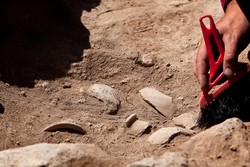Better integration for archaeological data
Archaeological data is scattered amongst a wide range of collections, journals, and inaccessible and unpublished fieldwork reports. Collating and sharing this information can help to create a new community of researchers eager to exploit the benefits of IT and incorporate it into established archaeological research methodology. The EU-funded ARIADNE(opens in new window) (Advanced research infrastructure for archaeological dataset networking in Europe) project successfully integrated archaeological information through its new infrastructure. It worked on facilitating cross-border access to data centres, tools and guidance, and the creation of new web-based services founded on common interfaces to data repositories. To achieve this aim, project partners collected and structured information regarding existing archaeological data sets and reference tools. In addition, current standards used in archaeological data sets have been reviewed and analysed. A survey of users’ needs and information regarding current available data provision were used to support data integration. Particular attention was given to the development of a documentation standard that reflects specific archaeological needs. Other activities concentrated on the preparation of a Linked Open Data system and set-up of language processing tools for dealing with large amounts of unstructured textual data. The resulting ARIADNE portal extends a central point of access to over two million records of archaeological resources. It brings together, for the first time, important data belonging to different bodies around Europe. These include the Archaeology Data Service, German Archaeological Institute, Italian Ministry of Cultural Heritage, Athena Research and Innovation Center, Cyprus Institute, and other online databases of key institutions and bodies. The ARIADNE project has enabled researchers to study the enormous wealth of data produced by archaeological records in Europe. This will stimulate new areas of research in archaeology by allowing researchers to compare data from ongoing and past field and laboratory work.



